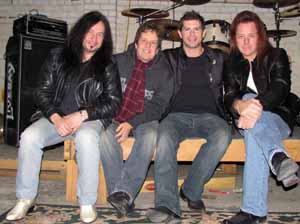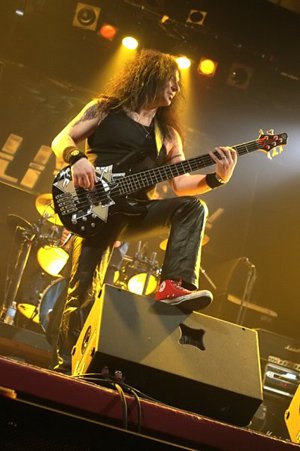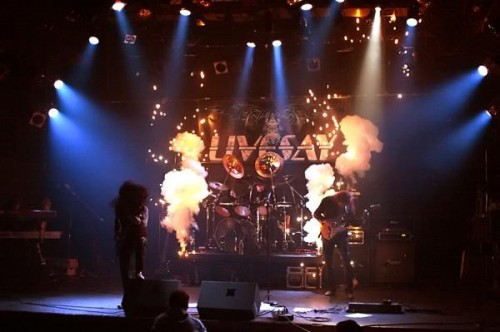Livesay
by Alex Barbieri
Staff Writer
On a very cold late January evening not far outside of New York City, I sat down in an industrial rehearsal studio with melodic power metal band, Livesay. In this casual and frank interview, the core of the group—guitarist Gregg Livesay, bassist Alan D’Angelo and keyboardist Tony Stahl—talk candidly about their new album Awaken the Giant (and why it took four grueling years to make), what it was like to open for Dio (twice), why new singer Jeff Gonzalez is going to take Livesay where they want to be and more.
Special thanks to photographer Jennifer Mann for taking candid pictures at this interview.
 HRH: Hey guys, how you doin’? Gregg, take us back to when you formed Livesay. What year was it and what prompted you to create the band after your namesake?
HRH: Hey guys, how you doin’? Gregg, take us back to when you formed Livesay. What year was it and what prompted you to create the band after your namesake?
GREGG LIVESAY: I started the band in February or March of ’91. And I would say primarily I did it because, at that time, I finished with like my fourth original project. I had started doing original music in ’85. And I would find that each time I would audition and get the job, and I’d devote a lot of time to writing and redoing guitar parts, and you rewriting stuff they already had, and within eight to 10 months, somebody would quit.
After it happened the last time to the band before Livesay, it fried me. I said “I was done.” Because I was so frustrated with it. I wasn’t happy with what I was playing or how I was playing. So, I figured I was going to step back and continue my education as a guitarist. After a few months, the singer and keyboardist from the previous band called me and convinced me to try and form a band. It fell into place pretty quickly, actually. I had no intention in the beginning of calling the band Livesay, but they convinced me and it stuck.
HRH: It’s a pretty cool name, actually. It rolls off the tongue.
ALAN D’ANGELO: Yeah, unless they mispronounce it as lyve-say. (Band laughs.)
HRH: Gregg, tell us about your influences and training and how you describe your style.
GL: In grade school, I played the trumpet. When I was 13, my Dad convinced me to pick up guitar. I began classical training for about four years by a (pauses) very ruthless old man. (Laughs.) He was very hard on me—very specific about neck posture and I was only allowed to play nylon acoustic guitar. I was not allowed to touch electric. To him, that was an aberration. Most purists like Andres Segovia thought it was an abomination, that real guitar playing was the classical nylon. And that’s the way this guy was.
The first year and a half of lessons, I absolutely hated it. I would never practice. It got to the point where my Mother said to the guy, ‘Look, he never practices, he’s not doing it. Am I wasting my money? He said, ‘I’m telling you right now, the kid’s got ability. Make him come back, and sooner or later it’s going to click. And it did. As I got a little older into my teens, I wanted to learn rock. After him, I went to another teacher and learned Hendrix and Clapton and Robin Trower, all the guys who were still relevant in the ‘70s.
HRH: What players had a big influence on you?
GL: First, Randy Rhoads had a huge influence on me. Not so much Eddie Van Halen, because I didn’t understand him. He was so out there to me because, what he was doing, was … I don’t even know if he knew what he was doing. I remember listening to “Eruption” for the first time and it frightened me because I had no idea what he was doing. I put it back in the jacket and didn’t listen to the record for like a year.
Randy Rhoads came a long and he was like a stepping stone for me because of that classical influence. Uli Roth, Ritchie Blackmore, and then Yngwie Malmsteen came along and totally changed the face of guitar playing as we know it. When I heard him play, I remember saying, ‘That is the way I want to be able to play some day.’ Even today, the guys that are out there now—Paul Gilbert, Jeff Loomis—all these guys all owe it to him because he absolutely revolutionized guitar playing.
 HRH: You’ve been at it 20 years. What keeps you going and motivates you to keep writing and playing live?
HRH: You’ve been at it 20 years. What keeps you going and motivates you to keep writing and playing live?
TONY STAHL: To try to improve on what we’ve done. There’s always that itch to keep writing stuff I don’t think you’re ever 100 percent satisfied with what you write, so we’re like, we need to make this better and improve this. Let’s try this. As a composer, you’re never fully satisfied.
ALAN D’ANGELO: And it’s a matter of survival. If you keep playing the same songs over and over again, no one’s gonna come see you. We’re not KISS. No one’s gonna say, “I hope they play “Rock And Roll All Night.” So you gotta play something new.
HRH: Some people consider your music progressive metal. How would you describe your own music?
GL: The first album we did was pretty mainstream sounding. Then the second album, we got a little bit heavier. If you listen to what we just did now compared to what we sounded like in ’96, you wouldn’t believe it. It doesn’t even sound like the same band. We’ve just gotten progressively heavier and I also think we’re better musicians than we were back then.
HRH: Let’s talk about the writing and recording of Awaken the Giant. I have a copy of it right here and there’s no doubt, listening to it, the level of musicianship among you guys. It’s very impressive.
ALL: Thank you.
HRH: What are some of your favorite memories over the years? What are some highlights?
TS: Well … the bus rides were always interesting. (Band laughs.)
GL: I have a few. The first was—after I formed the band—the second gig we got was opening for Steve Morse at World Stage (club in New Jersey). That was absolutely huge for me because Steve Morse is an icon. I had gone down to see him at the Ritz in Manhattan the week before. I knew he was great, but I had never seen him live. I stayed for about seven songs and I couldn’t take it anymore.
The other thing was definitely playing with Ronnie James Dio. That was just unbelievable.
HRH: You opened up for Dio? Wow, let’s talk about that.
GL: Twice, yeah, once in ’97 and again in ’98. I just remember when we got tapped to do the show how psyched we were. We couldn’t even believe we were going to get to share the stage with the guy. It was a tough gig. Whenever you do a national—especially with a band that’s been touring and as big as Dio—his people were … tough. Especially the stage manager. You’re at their mercy. The band themselves were very cool, but they’re usually on the bus so they don’t know what’s going on.
The second time we played with them was much better. He had a much nicer road crew and that guy was not with them. I remember, after our set I was down on the floor and I remember looking around the place. It was packed and they were turning people away at the front door—it was shoulder-to-shoulder, the balcony, everywhere. They couldn’t fit any more people. But I remember when he was on stage and he was singing “Don’t Talk To Strangers” and was just singing by himself, everybody was just absolutely blown away by him. His presence, his power. The guy just had incredible, incredible pipes. And so full of emotion. When he sang, you really felt like he was singing to you. He was the pinnacle of singers, and the fact that he’s gone is awful. He was the Pavarotti of metal, I would say.
HRH: Let’s talk about the writing and recording of Awaken the Giant. Alan, as the lyricist in Livesay, how did the whole concept come about for that?
AD: It comes about (thinking) something will just click. Or something will be mentioned to me. Like “Tower of Silence,” Tony just called me up one day and said, ‘Tower of silence … Google it.’ Others are about movies. “Flesh and Blood” is about “The Man in the Iron Mask.””Awaken the Giant” is about Pearl Harbor.”The Burning Times” is about the Salem Witch Trials. That’s something personal to me because I’m Wiccan. I researched it and found it really interesting.
I like to write about whatever is interesting and not clichéd. I’m tired of love songs. I’m tired of party songs. They’re great and have their purpose, but they’ve been beaten to death, so I like to do something different.
Dean, our former singer, wrote the lyrics for “The Agonist” and did an amazing job on it.
HRH: What are some of your favorites on Awaken the Giant?
AD: “Flesh and Blood.” Without a doubt, that’s my favorite song on the album.
HRH: You’re bass sound is monster, by the way. It made my car speakers rattle.
AD: We have to thank Chuck Naccarato. His mix on there just absolutely killed and it’s the first time practically in my entire career where the bass came out sounding the way I wanted it to. He nailed it and I want to thank him for that.
TS: It took a long time to do. A lot of ups and downs. It was an odyssey. We started in 2006. It took the better part of four years to get this thing out. That’s the proudest thing: that we actually did it and didn’t give up.
AD: We actually toyed with the idea of calling it Unsinkable because it seemed like everybody in the world was trying to put torpedoes into us. We wasted a lot of time and money with certain people. After a year and $3,000 we had nothing to show for it. But we just wouldn’t give up.
HRH: So what’s next for Livesay?
AD: Well, we’re going to continue pushing Awaken the Giant. We have a new singer, Jeff Gonzalez of R230. He’s got a very powerful, very Dio-ish crossed with Bruce Dickinson kind of voice. And what I love the most about him is … he emotes. There’s not a lot of singers who do that. He actually feels what he’s singing. His voice is where we want our music to be and it’s going to make writing the next album very interesting.
HRH: Guys, best of luck with the new singer and Awaken the Giant. Thank you so much for getting together to talk about the past and future of Livesay. This has been a lot of fun.
BAND: Thank you, Alex.
Livesay online:
Friend Livesay on Facebook.
Order Awaken the Giant at CD Baby.
Or at Shredguy Records.
Download Awaken the Giant on Amazon.com.

